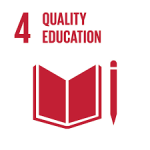Crescent Sustainability Initiatives
Partnerships for the Goals (SDG 17)
B.S. Abdur Rahman Crescent Institute of Science and Technology (BSACIST) has demonstrated a robust commitment to promoting Quality Education, aligning with Sustainable Development Goal 4 (SDG 4). The institute actively engages in educational outreach initiatives that extend beyond its campus, fostering a culture of inclusivity and lifelong learning. Through programs such as the Special Coaching Program for higher secondary students, BSACIST provides tailored educational resources to local schools, ensuring that students from diverse backgrounds have access to quality learning experiences. This initiative not only enhances academic performance but also inspires students to pursue higher education, thereby breaking down barriers to educational advancement.
In addition to coaching programs, BSACIST has made significant strides in bridging the digital divide by distributing computers to primary school children in adopted villages. This initiative empowers young learners with essential technological tools, fostering digital literacy and enhancing their educational opportunities. The university’s outreach efforts also include interactive lectures and demonstrations conducted by faculty and students, which engage the community and address specific educational needs. By integrating technology into education, BSACIST ensures that students are equipped with the skills necessary for success in an increasingly digital world.
The institute’s commitment to quality education is further exemplified through vocational training events and workshops that promote hands-on learning. For instance, the Miniature Model Workshop and Luminaire Design Workshop provide higher secondary students with practical skills in architectural design and lighting solutions. These workshops not only enhance participants’ understanding of design principles but also instil confidence in their creative abilities. By offering accessible educational opportunities, BSACIST plays a crucial role in preparing students for future academic and career pursuits, ultimately contributing to a more skilled and informed community.
Moreover, BSACIST actively engages with the local community through public educational events, such as legal awareness programs tailored for women. These initiatives bridge the gap between academic institutions and local populations, empowering individuals with essential knowledge and resources. By ensuring that educational opportunities are accessible to all, regardless of their background, the university reinforces its commitment to social justice and community empowerment.
In conclusion, B.S. Abdur Rahman Crescent Institute of Science and Technology exemplifies how academic institutions can champion Quality Education through active involvement in both campus and community initiatives. By fostering a culture of inclusivity, providing access to resources, and engaging in meaningful outreach, BSACIST is not only fulfilling its educational mission but also contributing to the broader goals of sustainable development and social welfare. Through these efforts, the institute is paving the way for a more educated and empowered society, ensuring that quality education remains a fundamental right for all.
A. Public Events for Lifelong Learning: Career Guidance Programme for Higher Secondary Students
On November 15, 2023, the Department of Polymer Engineering at B. S. Abdur Rahman Crescent Institute of Science and Technology organized a significant Career Guidance Programme aimed at Higher Secondary Students. This event exemplified the university’s commitment to lifelong learning by providing educational opportunities that extend beyond traditional academic boundaries. Open to students from various schools in and around Chennai, the programme served as a platform for young learners to explore potential career pathways in the field of polymer engineering. The initiative not only highlighted the importance of education in shaping future careers but also fostered community engagement by inviting local schools to participate in a collaborative learning experience.
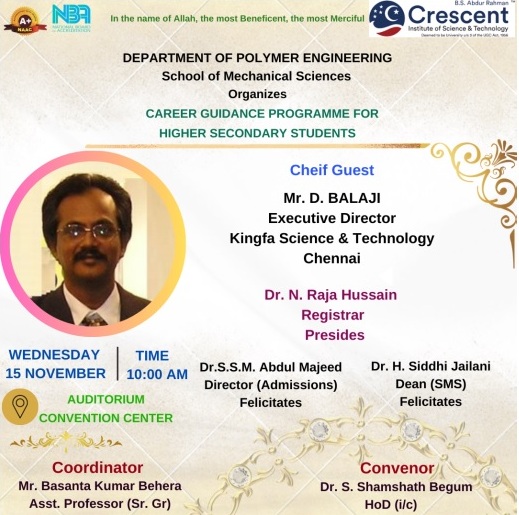
Figure XVII (3.4) – 1 : Invitation for the Career Guidance Program for Higher Secondary Students
The Students from the following schools participated :
- Crescent School, Chennai
- Anne’s Matriculation Higher Secondary School, Perungalathur
- Sankara Vidyalaya, Urapakkam
B. Commitment to Community Development through Educational Outreach
B.S. Abdur Rahman Crescent Institute of Science and Technology (BSACIST) has actively engaged in educational outreach activities beyond its campus, demonstrating a commitment to community development and the enhancement of local education. A notable initiative involved distributing computers to primary school children in the adopted villages of Keerapakkam and Karasangal on September 12, 2022.
This event, presided over by the Honourable Vice Chancellor, Dr A. Peer Mohamed, alongside Dr Raja Hussain, the Registrar of BSACIST, and local panchayat leaders, underscores the university’s dedication to improving educational resources in underserved areas.
Bridging the Digital Divide for Enhanced Learning Opportunities
The distribution of computers is a significant step in bridging the digital divide and enhancing learning opportunities for young students in these villages. By providing access to technology, BSACIST equips children with essential tools for their education and fosters an environment where they can develop digital literacy skills crucial for their future academic and professional endeavours.
This initiative reflects the university’s understanding of integrating technology into education, particularly in rural settings with limited resources.

Figure XVII (3.4) – 2 : Integrating Technology in to Education, particularly in Rural settings
C. Commitment to Lifelong Learning and Community Engagement – Bridging Legal Knowledge with Community Needs
The B.S. Abdur Rahman Crescent Institute of Science and Technology (BSACIST) has actively promoted lifelong learning and community engagement through public educational events. One notable initiative was a comprehensive legal awareness program for women from the nearby village. This event, titled “Legal Education Outreach: Bridging Legal Knowledge with Community Needs,” provided approximately 50 women with essential knowledge on critical legal issues such as domestic violence, property rights, dowry-related matters, and sexual assault. The university ensured accessibility by hosting the event in its Seminar Hall-I and offering free transportation to participants, highlighting its commitment to inclusivity.
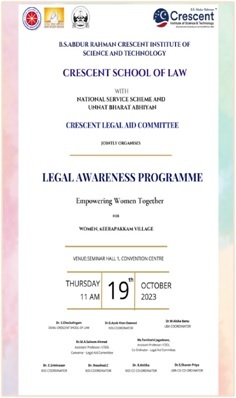
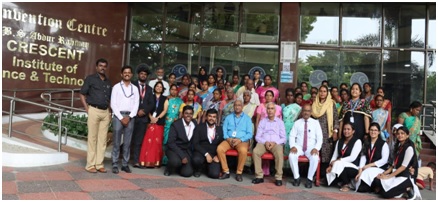
Figure XVII (3.4) – 3 : Legal Education Outreach: Bridging Legal Knowledge with Community Needs
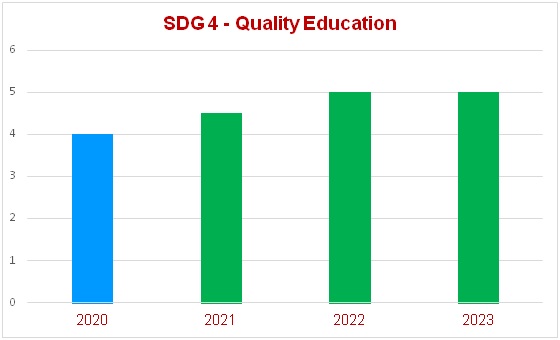
Rubrics for the SDG 4: Quality Education
| 4 to 5 | There is significant progress in effective implementation compared to the previous year |
| 3 to 4 | The necessary processes/activities (Graduates with teaching qualification, Lifelong learning measures, admitting first-generation students) have been implemented |
| 2 to 3 | There is an explicit plan to address the ‘Quality Education’ and necessitated processes have been initiated |
| 1 to 2 | There is an understanding and willingness to contribute effectively for achieving the UN targets of SDG 4 |
| 0 to 1 | There is no/partial willingness and plan to contribute for achieving the UN targets of SDG 4 Quality Education |
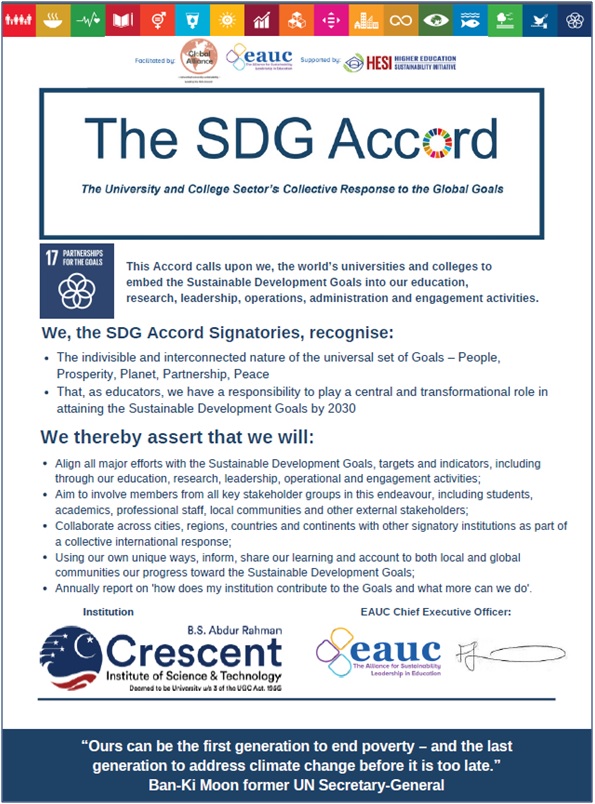
Please find the Report: SDG ACCORD REPORT


